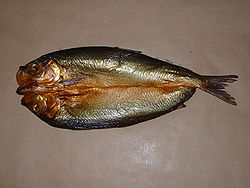
Kippering
Encyclopedia

Food preservation
Food preservation is the process of treating and handling food to stop or slow down spoilage and thus allow for longer storage....
meat (fish, poultry, etc.) by rubbing with salt
Salt
In chemistry, salts are ionic compounds that result from the neutralization reaction of an acid and a base. They are composed of cations and anions so that the product is electrically neutral...
and/or spices, followed by drying in smoke or warm air. This process is customarily enhanced by cleaning, filleting, butterflying
Butterflying
Butterflying is a cutting technique used by butchers to transform a thick, compact piece of meat into a thinner, larger one. The piece of meat to be cut is laid out flat on a cutting board and cut in half parallel to the board from one side almost all the way to the other. A small "hinge" is left...
or slicing the food to expose maximum surface area to the drying and preservative agents.
Originally applied to the preservation of surplus fish (particularly those known as "kips," harvested during spawning runs), kippering has come to mean the preservation of any fish, poultry, beef or other meat in like manner.
When used as a noun, kipper
Kipper
A kipper is a whole herring, a small, oily fish, that has been split from tail to head, gutted, salted or pickled, and cold smoked.In the United Kingdom, in Japan, and in some North American regions they are often eaten for breakfast...
, in the absence of more specific context, typically refers to herring or other small fish, kippered in the butterfly fashion (slit lengthwise ventrally, cleaned and unfolded in two symmetrical halves along the dorsal ridge).
The origin of the word kipper is Old English; the English philologist and ethnographer, Walter William Skeat
Walter William Skeat
Walter William Skeat , English philologist, was born in London on the 21st of November 1835, and educated at King's College School , Highgate School, and Christ's College, Cambridge, of which he became a fellow in July 1860. His grandsons include the noted palaeographer T. C...
, traces its derivation from the Old English, kippian, to spawn.
The practice of preserving fish by drying, using some combination of salt and smoke —particularly the seasonally plentiful spawning salmon and herring— predates 19th century Britain, possibly even recorded history.
Thomas Nashe
Thomas Nashe
Thomas Nashe was an English Elizabethan pamphleteer, playwright, poet and satirist. He was the son of the minister William Nashe and his wife Margaret .-Early life:...
writes in 1599 about a fisherman from Lothingland in the Great Yarmouth
Great Yarmouth (borough)
The Borough of Great Yarmouth is a local government district with borough status in Norfolk, England. It is named after its main town, Great Yarmouth.-History:...
area, who discovered by accident the benefit of smoking herring. It is also known that kippered fish were eaten in Germany and the custom reached Scandinavia in the Middle Ages.
See also
- KipperKipperA kipper is a whole herring, a small, oily fish, that has been split from tail to head, gutted, salted or pickled, and cold smoked.In the United Kingdom, in Japan, and in some North American regions they are often eaten for breakfast...
s - Sausage (Kippered beef snacks)

